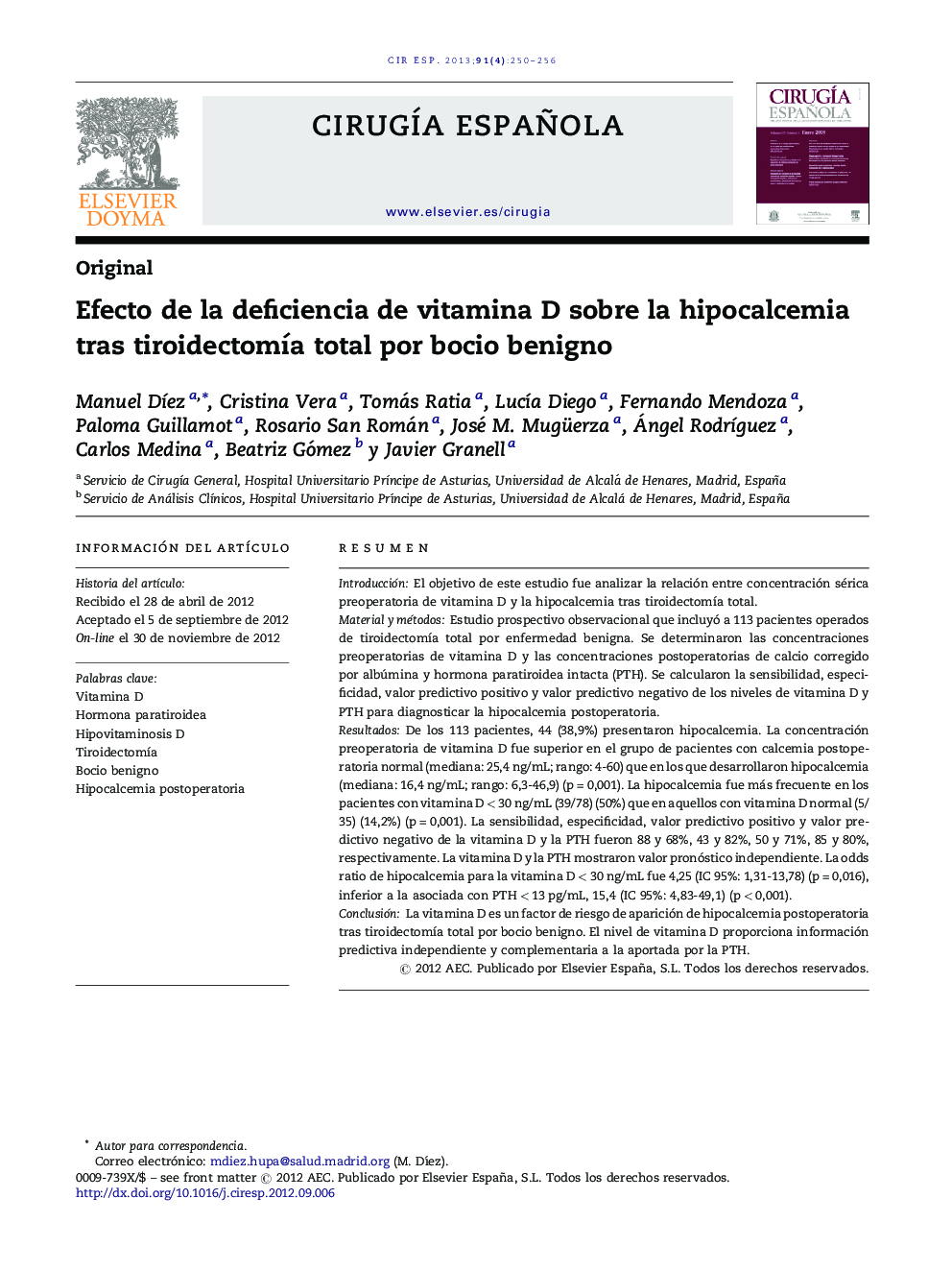| Article ID | Journal | Published Year | Pages | File Type |
|---|---|---|---|---|
| 4252617 | Cirugía Española | 2013 | 7 Pages |
ResumenIntroducciónEl objetivo de este estudio fue analizar la relación entre concentración sérica preoperatoria de vitamina D y la hipocalcemia tras tiroidectomía total.Material y métodosEstudio prospectivo observacional que incluyó a 113 pacientes operados de tiroidectomía total por enfermedad benigna. Se determinaron las concentraciones preoperatorias de vitamina D y las concentraciones postoperatorias de calcio corregido por albúmina y hormona paratiroidea intacta (PTH). Se calcularon la sensibilidad, especificidad, valor predictivo positivo y valor predictivo negativo de los niveles de vitamina D y PTH para diagnosticar la hipocalcemia postoperatoria.ResultadosDe los 113 pacientes, 44 (38,9%) presentaron hipocalcemia. La concentración preoperatoria de vitamina D fue superior en el grupo de pacientes con calcemia postoperatoria normal (mediana: 25,4 ng/mL; rango: 4-60) que en los que desarrollaron hipocalcemia (mediana: 16,4 ng/mL; rango: 6,3-46,9) (p = 0,001). La hipocalcemia fue más frecuente en los pacientes con vitamina D < 30 ng/mL (39/78) (50%) que en aquellos con vitamina D normal (5/35) (14,2%) (p = 0,001). La sensibilidad, especificidad, valor predictivo positivo y valor predictivo negativo de la vitamina D y la PTH fueron 88 y 68%, 43 y 82%, 50 y 71%, 85 y 80%, respectivamente. La vitamina D y la PTH mostraron valor pronóstico independiente. La odds ratio de hipocalcemia para la vitamina D < 30 ng/mL fue 4,25 (IC 95%: 1,31-13,78) (p = 0,016), inferior a la asociada con PTH < 13 pg/mL, 15,4 (IC 95%: 4,83-49,1) (p < 0,001).ConclusiónLa vitamina D es un factor de riesgo de aparición de hipocalcemia postoperatoria tras tiroidectomía total por bocio benigno. El nivel de vitamina D proporciona información predictiva independiente y complementaria a la aportada por la PTH.
IntroductionThe purpose of this study was to analyse the relationship between preoperative serum levels of vitamin D and postoperative hypocalcaemia after total thyroidectomy.Material and methodsA prospective observational study was conducted on 113 patients treated by total thyroidectomy due to benign disease. Preoperative vitamin D serum levels and postoperative albumin-corrected calcium and parathormone (PTH) levels were determined. Sensitivity, specificity, positive predictive value and negative predictive value of vitamin D and PTH levels, respectively, in the diagnosis of postoperative hypocalcaemia were calculated.ResultsHypocalcaemia was diagnosed in 44 (38.9%) patients. Vitamin D levels were significantly higher in the group of patients with normal postoperative calcium (median: 25.4 pg/mL; range: 4-60), compared to those who developed hypocalcaemia (median: 16.4 pg/mL; range: 6.3-46.9) (P = .001). Postoperative hypocalcaemia was more frequent in patients with vitamin D < 30 ng/mL (39/78) (50%), than among those with normal levels (5/35) (14.2%) (P = .001). Sensitivity, specificity, positive predictive value and negative predictive value were 88% and 68%, 43% and 82%, 50% and 71%, and 85% and 80% for vitamin D and PTH, respectively. Vitamin D and PTH showed independent prognostic values on the risk of hypocalcaemia. The OR associated with vitamin D < 30 ng/mL was 4.25 (95% CI: 1.31-13.78) (P = .016), and the OR of PTH < 13 pg/mL was 15.4 (95% CI: 4.83-49.1) (P < .001).ConclusionVitamin D deficiency is a risk factor of hypocalcaemia after total thyroidectomy for benign goitre. The vitamin D level provides independent prognostic information, which is complementary to that given by PTH.
